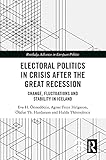Electoral Politics in Crisis After the Great Recession : Change, Fluctuations and Stability in Iceland
Material type: ArticleLanguage: English Publication details: Taylor & Francis 2022Description: 1 electronic resource (198 p.)ISBN:
ArticleLanguage: English Publication details: Taylor & Francis 2022Description: 1 electronic resource (198 p.)ISBN: - 9780429436345
- 9780429790683
- 9780429436345
- 9781138349384
- 9781032072999
Open Access star Unrestricted online access
This book examines to what extent politics in Iceland have been transformed in the aftermath of the 2008 financial crisis. The book focuses on whether the short-term sudden shock caused by the Great Recession has permanently transformed politics, political behaviour and the Icelandic party system or whether its effect was primarily transitory. These questions remain highly relevant to the wider field of political science, as the book examines under what circumstances sudden shocks lead to permanent changes in a political system. As such, the book situates the post-crisis Icelandic case both temporally and comparatively and evaluates to what extent the Iceland experience is reflective of broader patterns found in other Western democracies, particularly those other countries that were also hard hit by the Great Recession (e.g. Greece, Ireland, Portugal, Spain and Italy). This book will be of key interest to scholars and students of Nordic politics, Icelandic politics and society, electoral studies, political parties and party systems, representative democracy, political behaviour and more broadly to European and comparative politics.
Creative Commons https://creativecommons.org/licenses/by-nc-nd/4.0/ cc https://creativecommons.org/licenses/by-nc-nd/4.0/
English
There are no comments on this title.

